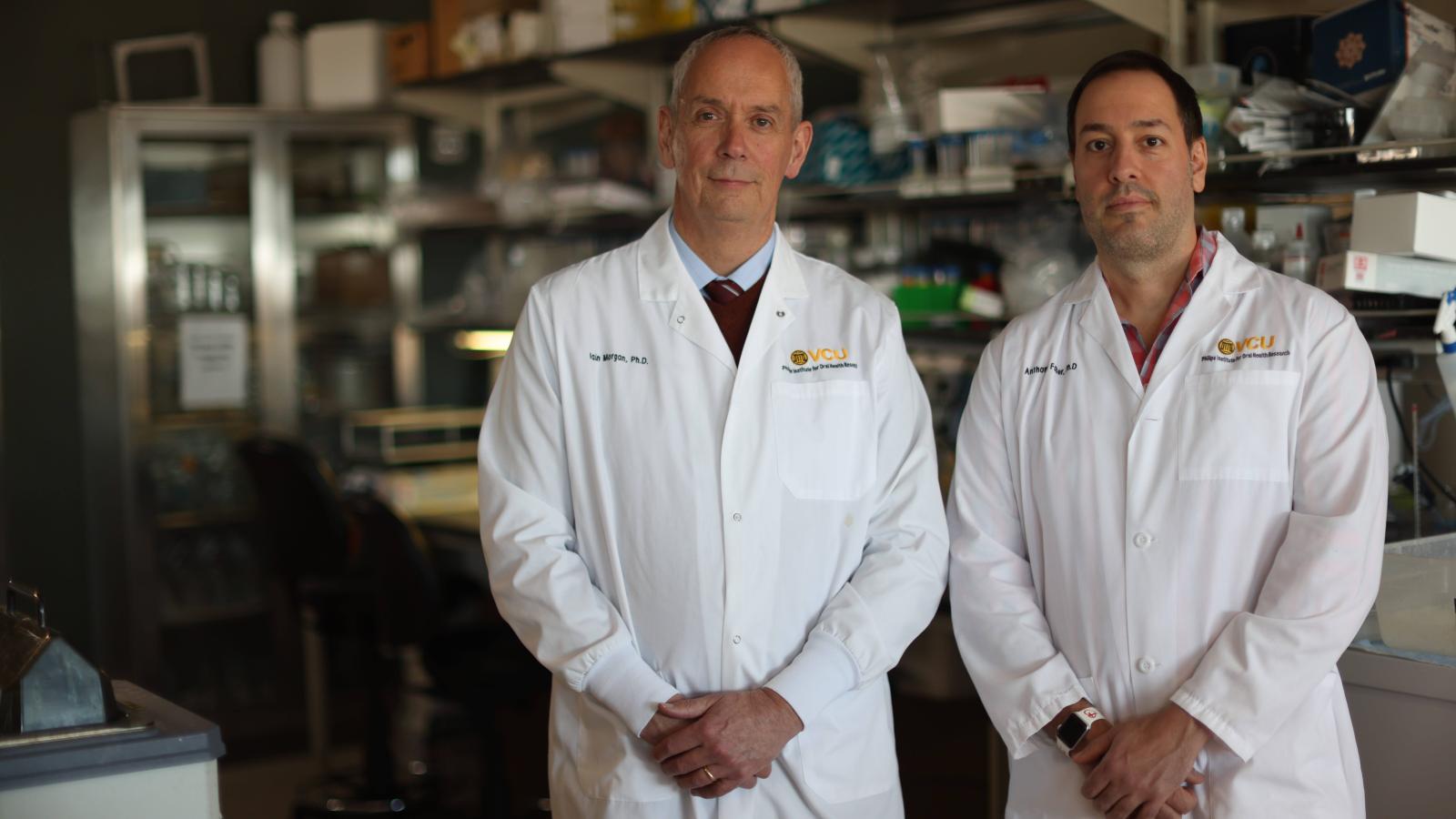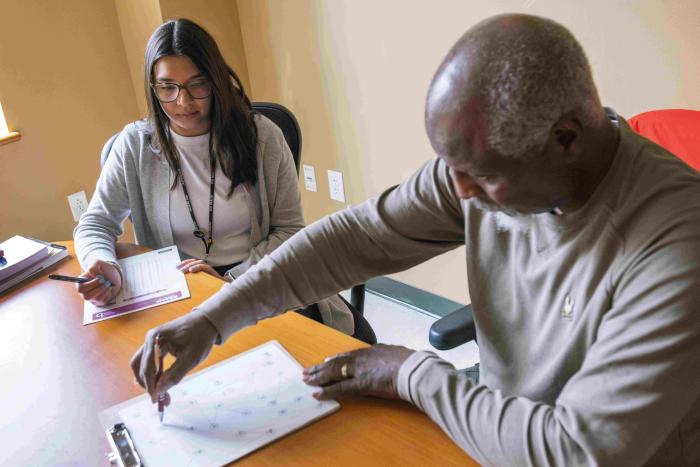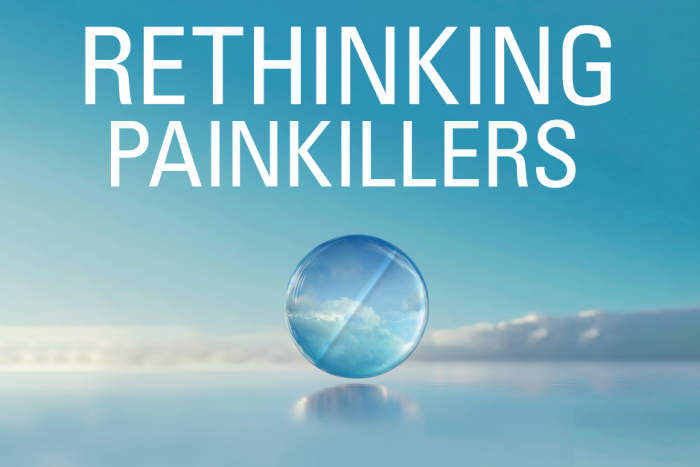
Tony Faber, Ph.D. (right), associate professor at the VCU School of Dentistry, is investigating a novel therapeutic that has the potential to change the trajectory of head and neck cancer treatment. Iain Morgan, Ph.D. (left), is director of the school’s Philips Institute for Oral Health Research where Dr. Faber is conducting his work. Photo: Tyler Trumbo, MCV Foundation
Raising Funds to Battle Head and Neck Cancer
When John F. Philips, D.D.S., donated $1.25 million to establish the Philips Institute for Oral Health Research at the VCU School of Dentistry in 1999, he did so to honor the memory of his father who died of throat cancer.
More than 20 years after that gift, Dr. Philips, a 1969 alumnus of the school, has made a challenge to fellow alumni and the wider community because the institute named for his father is on the brink of a breakthrough.
The prevalence of head and neck cancer is rising – and while effective treatments have been elusive for nearly 50 years, researchers at the Philips Institute are investigating a novel therapeutic that has the potential to change the trajectory of treatment.
All that is needed is help from those who may often be on the front lines of a diagnosis.
Your dollars will be doubled, but the impact could be lifesaving. The time is now, and I hope you will join me in this effort to change the trajectory of head and neck cancer.
John F. Philips, D.D.S., VCU School of Dentistry, Class of 1969
The VCU School of Dentistry is asking alumni and other supporters to contribute to a goal of raising $250,000 in support of the novel therapy, which Tony Faber, Ph.D., associate professor at the school, is leading.
If dentistry donors can raise $250,000 by May 3, Dr. Philips will match the gifts to create a total impact of $500,000.
“I am very impressed with and excited about the progress that Dr. Morgan and Dr. Faber have made in the area of targeted head and neck cancer therapy research,” Dr. Philips said. “It is unimaginable to me that head and neck cancer is increasing in the developed world, yet not many seem to be making this type of cancer research a priority.”
Dr. Philips said he is honored to be in the position to support this research and engage with the VCU School of Dentistry, and he encourages all who work in the field of dental health to join in this effort by contributing to this matching opportunity.
“Your dollars will be doubled, but the impact could be lifesaving,” Dr. Philips said. “The time is now, and I hope you will join me in this effort to change the trajectory of head and neck cancer.”
The money raised will support continued research into a novel targeted cancer therapy called SHP2 inhibitors – and their potential success in blocking the signaling in cancerous cells that ultimately fuel tumor growth in the oral cavity. New targeted therapies like SHP2 inhibitors are needed for head and neck cancer as current treatment modalities have remained static for decades and have limited success in promoting disease-free survival.
If effective in pre-clinical models, SHP2 inhibitors would be tested in combination with the current standard of care in clinical trials. Patients who have relapsed or have exhausted current treatment approaches would be recruited to these trials.
Head and neck cancer is the only cancer in the developing world that’s increasing – most cancers are decreasing.
Iain Morgan, Ph.D., director, Philips Institute for Oral Health Research
These types of cancers are a focus of the Philips Institute, Dr. Faber said.
“Head and neck cancer is the sixth largest cancer in the world,” he said, but when it comes to treatment, “targeted therapies that have traditionally been developed for other cancers like lung or blood cancers do not work in the head and neck because the biology is different – the drugs just don’t match what’s going on in these cancers.”
But that is starting to change, he said. “The chemistry has gotten more sophisticated, and the drugs are able to do things they weren’t able to do 10 or 15 years ago.”
While smoking causes head and neck cancer and tends to show up in the front of the mouth or the lips, the spike in head and neck cancer in recent decades is coming from another cause: human papillomavirus, a viral infection transmitted through sex or other skin-to-skin contact.
HPV-related cancers strike within the pharyngeal region – at the back of the throat or the base of the tongue.
“Head and neck cancer is the only cancer in the developing world that’s increasing – most cancers are decreasing,” said Iain Morgan, Ph.D., director of the Philips Institute for Oral Health Research. Whereas women can receive HPV tests during a Pap test to detect the virus, there is no oral cavity equivalent of that test.
“We’re in an epidemic that’s just going up,” Dr. Morgan said, “and for these people in this ongoing epidemic, they’re desperately needing therapies.”
He said dentists and hygienists play a direct role because they can alert patients to a problem during routine cleanings and other dental procedures. Checking for lesions and pressing around the head and neck regions to feel for swollen local lymph nodes could ultimately save a patient’s life.
Dentists are on the front line of oral cancer detection and have helped manage this disease in the community.
Lyndon F. Cooper, D.D.S., Ph.D., dean, VCU School of Dentistry
Lyndon F. Cooper, D.D.S., Ph.D., dean of the VCU School of Dentistry, called HPV-related head and neck cancers “debilitating.” Dr. Faber’s research within the Philips Institute, which is affiliated with Massey Cancer Center, means discoveries in therapeutic strategies and management can be directly linked to VCU Health patients who need care.
“We are seeking support to progress our recent work in head and neck cancer toward patient clinical trials and we hope that the VCU dental community can partner with us in the development of novel head and neck cancer therapeutics,” Dr. Cooper said. “Dentists are on the front line of oral cancer detection and have helped manage this disease in the community.”
Cindy Cheely strongly agrees. Sixteen years ago, the Richmond resident visited her dentist for a routine cleaning when her hygienist saw a sore that had been on Cheely’s tongue for a few weeks. The hygienist and the dentist referred her for a biopsy the same day.
To her shock, Cheely said, the lump was cancer.
She had surgery to remove the cancer, but it came back six months later. She had another surgery, this time at Massey Cancer Center, in which half of her tongue was removed, she said, and her treatment included radiation and chemotherapy.
The road to recovery was horrible. The skin on her neck – and in the inside of her mouth – was peeling from the radiation, she said. For a year, she ate through a feeding tube.
Still, Cheely considers herself lucky that her cancer was caught before it could spread to any other parts of her body. That, and it has not returned. She credits her dentist office back then with saving her life.
“Your mouth is a gateway to your body and so many things are connected to that so it’s important to make sure your teeth and mouth are healthy,” she said, “so the rest of your body can be healthy.”
If her dentist’s office had not recognized the problem back then, Cheely said, “I probably wouldn’t be here.”
If you are interested in supporting head and neck cancer research at the Philips Institute, you can give online now, or contact Gloria Callihan, the School of Dentistry’s associate dean of development and alumni relations, at 804-828-8101 or gjcallihan@vcu.edu.


